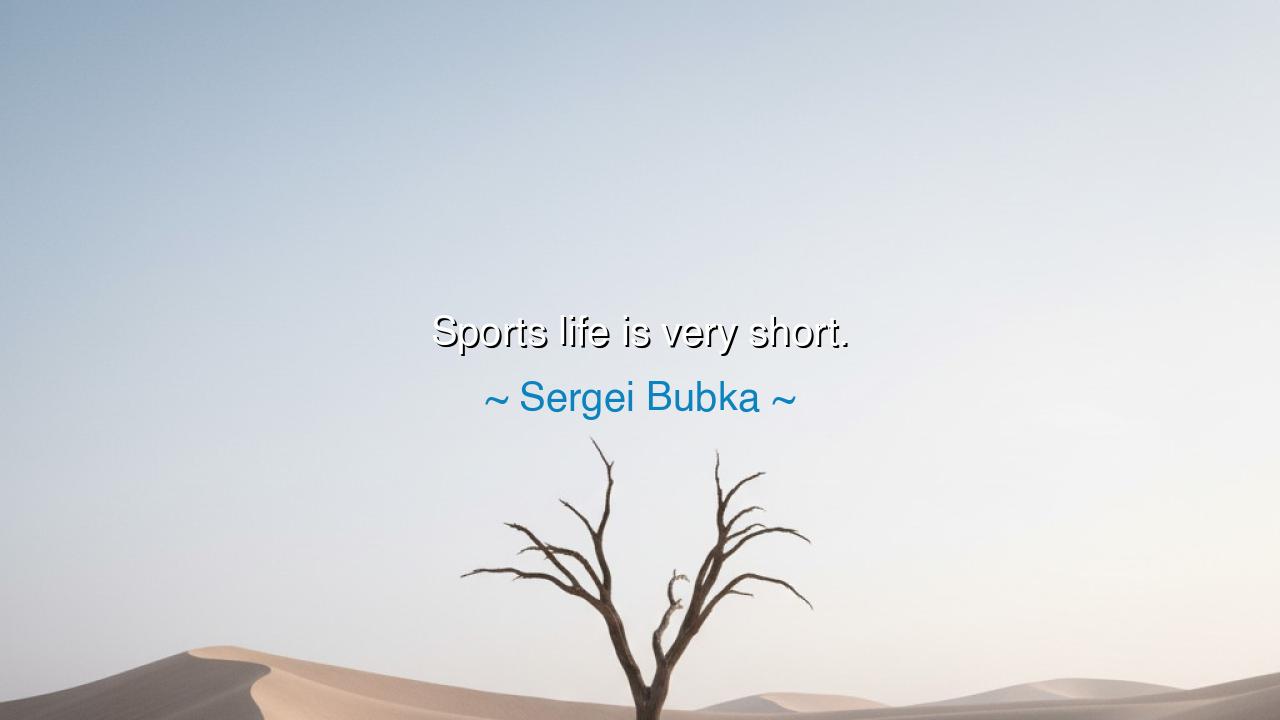
Sports life is very short.






The words of Sergei Bubka, the legendary pole vaulter, strike with both simplicity and gravity: “Sports life is very short.” To many, it is merely a statement of fact, but to those who listen with the ear of wisdom, it is a reminder of the fleeting nature of glory, the fragility of the body, and the urgency of discipline. In these few words, Bubka condenses the essence of an athlete’s existence — that the flame of competition burns bright, but it burns swiftly, and what matters most is how one chooses to spend those brief years beneath the light.
The meaning of this statement lies in the recognition of human limitation. The body, however strong, is bound by time. Muscles weaken, speed fades, reflexes dull. Even the greatest athletes cannot escape this truth. Unlike scholars or artists, whose craft can grow richer with age, the athlete must perform in the brief window of youth and strength. This brevity gives sports life both its beauty and its tragedy — beauty, because its moments are so intense; tragedy, because they cannot last.
The origin of Bubka’s words comes not from theory but from experience. As the six-time world champion and Olympic gold medalist, he reigned over pole vaulting for more than a decade, yet even he felt the weight of time pressing on his shoulders. Each victory was followed by the knowledge that it might be his last. Each record broken reminded him that another, younger challenger was rising. His wisdom was forged in the arena, where triumph always dances beside the shadow of decline.
History bears many examples of this truth. Consider Jesse Owens, whose brilliance in the 1936 Olympics stunned the world, yet whose career was brief and whose later years carried struggles far from the track. Or think of Nadia Comăneci, the gymnast who achieved perfection at 14, only to see her body and career move swiftly into decline. Their stories remind us that sports life is measured not in decades, but in moments — moments that echo long after the cheering has faded.
Yet Bubka’s words are not meant to instill despair, but urgency. If sports life is short, then every training session matters, every competition is precious, and every sacrifice is meaningful. The brevity of the athlete’s path calls forth dedication, for there is no time to waste. It demands not only physical strength, but mental clarity, for the margin between triumph and obscurity is razor-thin when the years are so few.
The lesson for us is universal: all of life contains seasons of brevity, windows of opportunity that will not remain open forever. For the athlete, it is the body; for the scholar, it may be inspiration; for the leader, it is the season of power. We must recognize when our time is now, and seize it with all our heart. To delay, to drift, is to lose the chance that will not return.
So let us honor Bubka’s teaching. If your own sports life is short, live it with intensity, and when it ends, let the discipline and wisdom gained carry you into new arenas. If your season is not in sport but in some other pursuit, treat it the same way: with urgency, gratitude, and passion. For all of us, life itself is short — and the glory of our days lies not in their length, but in the fire with which we choose to live them.






AAdministratorAdministrator
Welcome, honored guests. Please leave a comment, we will respond soon